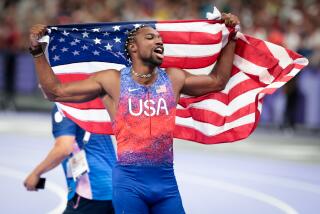Mel Patton dies at 89; Olympic gold medalist runner
- Share via
Mel Patton, an Olympic gold medalist and USC sprinter who at one time was deemed the fastest human on Earth, has died. He was 89.
Patton, who had cancer, died May 9 at his Fallbrook, Calif., home, his wife, Shirley Patton said.
“Pell Mel,” as he was called, set world records for the 100-yard dash in 1948 and the 220 in 1949. His 100-yard mark of 9.3 seconds endured until 1961, when Frank Budd beat it by a tenth of a second.
At the 1948 Olympics in London, Patton ran before British royalty on a cinder track built from the pulverized remains of bombed-out buildings. In the 200-meter competition, he won a gold. In the 4x100-meter relay, he anchored a U.S. team that finally received its gold medals after judges wrongly awarded them to the United Kingdom.
“We were doggone better than the Brits and we knew doggone well that we beat them, and we were upset about it,” Patton recalled in an oral history for the Amateur Athletic Foundation of Los Angeles.
After successfully challenging the judges’ call on a baton pass, the four men on the team were sent their medals by mail, months later.
With modesty, Patton, a five-time NCAA champion, didn’t crow about his fleeting achievements.
“Most of the people we associated with had no idea,” his wife said. “He believed you wear the crown for one day and then get on with your life.”
In fact, he was one of three “fastest humans on Earth” from USC. His predecessors were Charley Paddock — dubbed the “California Comet” in the 1920s — and Frank Wykoff, a 1933 graduate who set the 100-yard record that Patton broke.
Born in Los Angeles on Nov. 16, 1924, Melvin Emery Patton graduated in 1943 from University High School, where he ran track.
He joined the Navy, serving stateside as a seaman and aviation cadet until 1945, when he enrolled at USC.
As a sophomore under renowned coach Dean Cromwell, Patton tied the world record of 9.4 seconds in the 100-yard dash. The next year, at a meet in Fresno, he beat it.
A lanky 6-footer, Patton ran with a grace that inspired poetic flights on the sports pages.
Competing against University of Illinois great Herb McKenley at the Coliseum in 1947, he “sped with the smoothness of flowing oil, as effortless as a feather airborne atop a friendly breeze,” the Track and Field News wrote at the time. The matchup, which Patton won, drew 47,000 fans.
“Lean, almost wraithlike, he glided rather than sprinted,” the Times’ Mal Florence wrote in 1983. “He didn’t pound a track, just caressed it.”
For his part, Patton was so intensely focused that he vomited after some of his better races.
“It’s a funny thing,” he told Times columnist Jim Murray in 1983. “I never threw up after the100 and I threw up after the 200 if the time had been 20.7 or less. My stomach seemed to know before the timer did.”
At the Olympics, he came in a dismal fifth in the 100-meter competition. The race was a shocker, with hurdler Harrison Dillard edging by Patton’s real rival, 31-year-old Barney Ewell.
Ewell “should have been the winner,” Patton said years later. “At the finish, he saw he was beating me and jumped up in the air and threw up his hands. He didn’t look at Harrison, who was on the other side of him. Barney was matching himself against a guy who finished fifth.”
Later, he won the 200 in a dramatic final burst and picked up his second gold in the disputed relay race. Judges ruled that U.S. team members passed the baton outside the legal passing zone but they changed their minds after reviewing films the next day.
After the Olympics, Patton returned to USC, where he received his bachelor’s and a master’s degrees in education. A husband and father, he had worked part-time repairing shoes in West Los Angeles while going to school.
“In those days, you needed to make money to support your family,” he said. “And there was no money in track and field.”
Patton said he never considered accepting the under-the-table fees that he knew other runners were accepting.
“In my naivete, I didn’t think they’d let something like that continue,” he told The Times in 1983. “If … it all came out, would it really have been worth it?”
Patton coached at Long Beach City College and the University of Wichita (now Wichita State) before returning to Los Angeles and working as an executive for Northrop Corp., Litton Industries and other firms.
In the mid-1970s, he ran Saudi Arabia’s effort to train athletes for international competition.
In addition to Shirley, his wife of nearly 69 years, Patton’s survivors include his daughter Susan, son Gary, five grandchildren and a great-grandchild.
More to Read
Start your day right
Sign up for Essential California for the L.A. Times biggest news, features and recommendations in your inbox six days a week.
You may occasionally receive promotional content from the Los Angeles Times.







